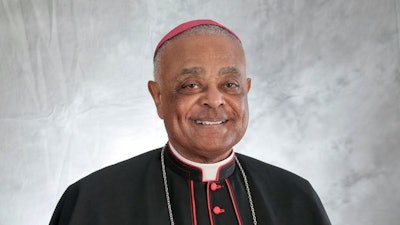Archbishop Wilton Gregory of Washington, D.C. made history on Saturday — becoming the first African American cardinal.
 Cardinal Wilton Gregory
Cardinal Wilton GregoryHis ascendancy in the Catholic Church marks a momentous and symbolic turning point in a year that was filled with historic firsts, including the election of the nation’s first woman of color to the second highest office in the land.
“Among the people that have congratulated me and wished me well, friends and colleagues, I’ve heard this: it’s about time,” Gregory told The Washington Post. “But it is also an important recognition that the African American, the Black Catholic community, is an important component within the larger, universal church.”
The ceremony, known as a consistory, was unorthodox due to the impact of COVID-19. About 100 people witnessed the elevation of Gregory and 12 other bishops and priests to the College of Cardinals at the Papal Basilica of Saint Peter in the Vatican.
Social distancing protocols were put in place and masks were worn by cardinals when seated. Some chose to remove their masks when receiving their ring and biretta; however, Gregory wore his for the duration of the ceremony.
 Sr. Ann Howard
Sr. Ann Howard“My heart was warmed when [Gregory] wore a mask to receive his ring and the biretta,” said Sr. Ann Howard, director of campus ministry at Trinity Washington University, the nation’s first Catholic liberal arts college for women founded in 1897 by the Sisters of Notre Dame de Namur. “I just respect the choice of his so much just because I think it speaks volumes. He acknowledges the pandemic and protected the Pope.”
Those who traveled to Rome were also required to quarantine at the Vatican for 10 days.
Two of the new cardinals, Brunei Apostolic Vicar Cornelius Sim and Archbishop Jose F. Advincula of Capiz, were unable to attend in person. To accommodate them and others who could not travel, television screens were placed around the Basilica to launch a live stream.
The Catholic Church now has 229 cardinals, 73 of whom were named by Pope Francis. Only 128 are eligible to vote for the next pope.
Despite the changes to the consistory, Dr. Kurt Martens, professor at the Catholic University of America, emphasized that it does not “mean it was less significant” and represents a number of progressive reforms championed by Pope Francis, including vocal support for same sex unions.
A popular fixture throughout Washington, D.C., Gregory previously served as the archbishop of the Archdiocese of Atlanta, bishop of the Diocese of Belleville, Illinois and auxiliary bishop of Chicago. He was also president of the United States Conference of Catholic Bishops in 2001 after serving as vice president for three years.
 Dr. Kurt Martens
Dr. Kurt MartensNow, as a cardinal, Gregory will continue to play a greater role in helping the Catholic Church heal following the Theodore McCarrick sexual misconduct scandal that rocked the church. Despite knowing about the ongoing abuse, McCarrick was named as archbishop of Washington, D.C. in 2001 by Pope John Paul II. He retired in 2006.
“He is going to acknowledge that and bring us a step further, moving forward toward healing,” said Howard. “So that will be something I think we not only hope for but expect to happen with time.”
Gregory’s cardinal appointment has generated enthusiasm among parishioners and scholars who study the church.
“I think he is going to be an important person in terms of being African American and understanding what the African American community in general and the African American Catholic community has gone through in this country in particular,” said Martens. “This makes him the right man, the right place, the right time.”
Within the current political climate and the fight for racial equity, Howard said Gregory’s personality “brings people together, not divide them.”
“I think that is something extremely significant,” she said. “The fact that he became a cardinal just echoes that even further. ”
Martens agrees, adding that Gregory will also be a champion for social justice.
“That image of the church as a field hospital, the church being there to heal wounds, not to condemn people, not to push out people, not to stand there with the finger,” said Martens. “I think that is enormously important. It does not mean that he ignores doctrine, but there is on the one hand what the church teaches and then there is what people are and how you accompany them to get where they need to be. I think that is just incredible.”
As cardinal, Gregory has said he will be the “voice for the African American community in the pope’s ear.” There are about three million African American Catholics in the United States, representing roughly 4% of the nation’s 69 million Catholics.
“I think the timing of this is what makes it special,” Howard added. “Anti-racism is a big deal right now. We have to all move to embrace it. And this is where the church is helping to heal our racist American life.”
Sarah Wood can be reached at [email protected].















